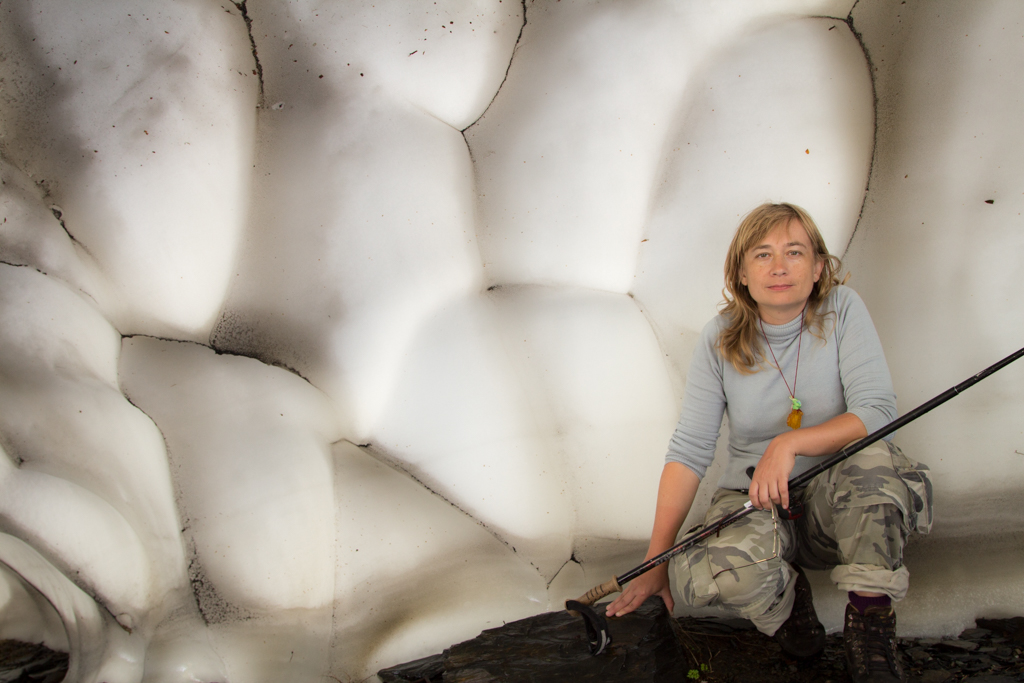Yulia Naberezhnaya and Andrey Rudomakha
Western Caucasus, Russian Federation
Words by Prabal Kr. Das
 Photo: Mikhail Plotnikov
Photo: Mikhail Plotnikov
Courage, conviction, confidence amid adverse conditions define Yulia Naberezhnaya, who for long has been sustaining efforts to preserve the World Heritage listed Western Caucusus. She along with Andrey Rudomahka are spearheading outstanding work to highlight this pristine region with unique geological and ecological values, while at the same time standing firm against threats facing the site.
The Western Caucasus is recognised under the World Heritage Convention for its great diversity of undisturbed ecosystems, which support wildlife such as the European bison. Its conservation outlook is assessed as of significant concern by the IUCN World Heritage Outlook.
Andrey’s involvement in the protection of the Western Caucasus started before it was inscribed on the World Heritage List. In 1995, he initiated the creation of Bolshoy Thach Nature park, which is now part of the listed site.
Yulia is only person who provides monitoring in the southern part of the site. As a local residing here for three generations and as a mother, she has a personal interest in the availability of drinking water, and the Western Caucasus contains headwaters of the region’s rivers. “I see a need to protect freshwater to secure sustainable development as well as the fundamentals of human survival – this has been the determining factor for my personal involvement in the protection of the site,” she says.
In their view, the public has to have a say in economic decisions related to World Heritage sites.
It is clear that natural World Heritage sites inspire her awe: “Magnificent landscapes offer human beings an opportunity to connect with eternity.” For her, it is everyone’s moral obligation to protect these exceptional places – an obligation which she and Andrey fully embrace in their work for the Western Caucasus. “The preservation of the Western Caucasus is a fact, not a mere sign of recognition for our nation. This is an honorable responsibility, a sign of culture and recognition of universal human values, as well as of traditional management of natural resources.
“But this is also a huge responsibility in terms of conservation. Development has to be sustainable and local communities need to understand the importance of the implementation of commitments.”
Both Yulia and Andrey have successfully motivated locals to present a voice of unity – one that is loud, reasoned and strong. In their view, the public has to have a say in economic decisions related to World Heritage sites. It was largely due to their rapport with journalists that concerns over environmental impacts felt around the time of the 2014 Winter Olympics in Sochi were exposed in international media.
Andrey was one of the leaders who fronted a successful campaign to move the construction of Olympic infrastructures from Grushevyi Ridge in the buffer zone of the Western Caucasus. He was influential in preventing several threats, such as illegal logging in parts of the site and winter sport facilities planned in the Lagonaki Plateau.
Yulia participated in public hearings on a planned cable road to Lunnaya Poliana. Her speeches received enough support to stop the construction of the road. Now she campaigns against a planned ski resort in Sochi Zakaznik, an area which Russia has committed to protect to compensate for environmental impacts from the Olympic games. Her views have also appeared in well regarded publications, including Scientific American.
Their message to the generation ahead is to never give up, never lose faith despite pressures from others.
Together with their team, Yulia and Andrey are today actively campaigning to protect the headstreams of the Mzymta River – the largest body of water in Russia flowing into the Black Sea. According them, the issue is critical. The most serious threat is the possible expansion of ski resorts around Sochi Olympics venues.
“We need to look to the future. It’s about water security for the region. River headstreams must be protected,” says Yulia. “The Mzymta River headstreams are a valuable site that Russia promised to protect before the 2014 Winter Olympics. We urge the international community to speak out at the closing of UNESCO’s 40th World Heritage Committee session in October and sign our petition.”
Unwavering in their conviction, their message to the generation ahead is to never give up, never lose faith despite pressures from others. “Stay true to your mission. Do as your heart tells you. The light will vanquish the darkness. The future belongs to you, and it will be beautiful!”
Yulia Naberezhnaya is a biodiversity protection projects coordinator at Sochi division of the Russian Geographical Society. Andrey Rudomakha is the coordinator of the Environmental Watch on North Caucasus.
Choose Yulia and Andrey were selected as Heritage Heroes. All candidates to the Heritage Heroes awards were celebrated during the IUCN World Conservation Congress on 3 September 2016. The people's choice award was confered to Bibhuti Lahkar.
